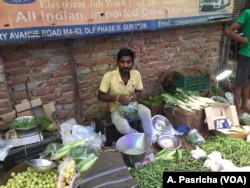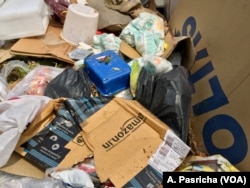Supermarkets, food delivery outlets and street vendors in Mumbai are scrambling to replace plastic bags, containers and bottles as authorities impose a sweeping ban on single use plastic items in India’s biggest city.
As some 250 inspectors spread through the teeming metropolis of 20 million to enforce the crackdown, outlets of Burger King, McDonald’s and Starbucks were among dozens slapped with penalties.
The ban in Maharashtra state, of which Mumbai is the capital, has won accolades from those who have warned that the plastic littering India’s cities and countryside and choking its rivers has become a serious environmental and health hazard. But it has been slammed by the plastics industry, which says it will cost 300,000 jobs in the state.
The ban came into effect weeks after Indian Prime Minister Narendra Modi pledged to eliminate single-use plastic in India by 2022 and be on the front lines of global efforts to reduce its use.
While many Indian states have imposed similar or partial bans in recent years, critics say it has made little difference due to poor enforcement.
However, Maharashtra is promising to more strictly implement the ban. A first-time offense draws a fine of about $75, and repeat offenders will have to pay even heftier penalties and face possible jail time.
The tough enforcement has taken aback businesses that never seriously considered options to plastics, even though the ban was announced three months ago.
While big food outlets have begun handing out wooden cutlery and paper cups, smaller ones are finding it hard to comply.
“I am stuck. I don’t know how to cope with it. I am going from door to door, but everyone is clueless,” said the owner of a popular butcher shop in an upmarket area of Mumbai. He complained he has been scrambling to find alternatives but they are too expensive and not even available as demand spikes. Worried about penalties, he does not want to be named. “I hope they [inspectors] don’t come here till we get our stock.” He has cut down home deliveries and is advising customers to bring their own bags or containers to pick up their meats.
Retail associations said that many small shops were forced to close while they searched for alternatives.
Vanashakti, a Mumbai non profit environmental group that strongly supports the ban, says the tough measures are urgently needed in a country where plastic pollution has reached alarming levels.
In India's burgeoning towns and cities, barely half the plastic garbage is collected and recycled. The rest lines street corners, chokes drains or is dumped in massive landfills. Plastic bags littering Mumbai’s streets or washing up along its long coastline are a common sight.
It is an even more serious hazard in the countryside, where lack of a proper waste disposal system means most people just burn their garbage. “The burnt residue is full of toxins, which is released in the air, and what remains on the ground gets washed into the rivers and is ultimately contaminating and putting carcinogens in our food chain, in our drinking water,” warned Stalin Dayanand, Vanashakti's director.
The plastic industry insists it is difficult to replace the convenience of plastic packaging and takeaways, and is urging the government to focus on other ways of tackling the plastic menace, such as proper garbage disposal.
“You can always put the clock back, but at the end of the day, there will be consumption, there will be waste generation,” says Hiten Bheda, the head of the All India Plastic Manufacturers Association. “We have to manage that waste somehow and we have to bring elements of reuse, recycle and reduce.”
Meanwhile, green campaigners are underscoring the need to make cheaper alternatives available if the ban is to work and they want subsidies for those who manufacture eco-friendly packaging.
But development of those alternatives promises to be slow.
“Innovation in that is in a very nascent stage. There are not many alternatives that have come out,” says Richa Agarwal at New Delhi’s Center of Science and Environment. While strongly supporting the ban, she stresses the need for more preparation to phase out single use plastic but ruefully says that “whenever it does happen it will hit hard, the way plastic is integrated with our lives, it is going to be tough at any point of time.”
How Mumbai copes with the ban will be closely watched. While environmentalists hope Maharashtra state will show the way on tackling plastic pollution to the rest of the country, others worry that populist pressures could dilute the ban in an election year.
A United Nations report this month urged governments to consider banning or taxing single-use bags or food containers to stem a tide of pollution that research says could result in more plastic by weight than fish in the oceans by 2050.














